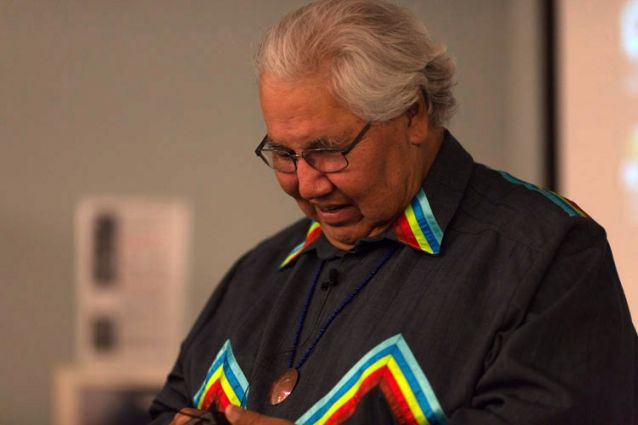The term “just transition” is on a lot of lips these days. As natural disasters, from fires to floods, hit the country in this hot summer, the federal government introduced legislation outlining what its vision for a climate transition would look like as it relates to workers in affected industries. That legislation, The Sustainable Jobs Act, has been described by critics as “another plan to make a plan.” The legislation—which it isn’t too late to strengthen—will be debated in the Fall parliamentary session.
The federal government isn’t exactly breaking new ground. The workers’ movement across the world has been demanding a just transition for decades—a term that refers to a climate transition that puts workers and communities first.
In Canada, Iron and Earth is one of the organizations that has been working towards a just transition. The organization, which was founded by Alberta oil and gas workers during the oil price collapse in 2016, works to help fossil fuel workers transition to careers in renewable energy.
The Monitor caught up with Alexandra Tavasoli, chair of the organization’s board of directors, to talk about the role fossil fuel workers play in the climate transition, the Sustainable Jobs Act, and how the organization plans to scale up its activities. The interview has been edited for length and clarity.
Jon Milton, The Monitor: How does Iron and Earth support fossil fuel workers who are looking to transition to work in a decarbonized economy?
Alexandra Tavasoli: Iron and Earth's programming directly supports communities and workers throughout all the stages of their career transition and the energy transition. The organization believes that creating local, well-paying, unionized jobs in the net zero economy will grow socially just community systems around them.
Through our programming, we help workers make a training plan for themselves and discover the transferability of their existing skill set to the sustainability sector—or any upskilling they require. We facilitate “adult internships,” where workers are paired with companies to be trained on the job while being paid. Then, the trained workers can find opportunities for jobs on our climate career portal or within the community energy projects that we deploy.
In addition to training workers, we work directly with communities to build energy programs that can increase community energy autonomy. We've most recently worked with the Dehcho First Nation in the Northwest Territories to install solar panels on houses and offset the use of diesel in that community. That system is being maintained and was installed by community members themselves. That's the lifecycle of a worker transition.
Milton: What role do you view Iron and Earth playing within the broader process of a just transition?
Tavasoli: We view community energy autonomy—specifically through a reduced reliance on the fossil fuel sector—as a key to both reconciliation and a just transition. It decreases the proportion of community members that take on fly-in-fly-out work in the resource sector, which provides more stability for families and the community. This provides a foundation from which local businesses in that community can thrive—and it provides a stable population that can justify investment into social programs, health care centers and local public transit. It really has a sprawling effect.
This is in line with both the National Adaptation Strategy and the mandate of the Federal Ministry of Rural Economic Development, and can help reduce the rapid depletion of population from rural communities. So you can really revitalize rural communities and build them into sustainable energy centers.
Milton: What is Iron and Earth's perspective on the Sustainable Jobs Act?
Tavasoli: We believe that although the transition doesn't necessarily have to be state-led, it does need to be state-supported. We saw a number of positives and negatives from the tabled draft bill.
As many other environmentalist organizations have been saying, the act was light on definitions. It didn't pin down what a “sustainable job” is or at what points in the renewable energy product lifecycle that boundary is drawn. So, for example, installing solar panels might be a sustainable job, but extracting the raw materials that solar panels are made out of is a point of contention as to whether that is included.
We consider sustainable jobs to be good-paying local and unionized jobs with benefits that do not contribute to the effects of climate change.
The act was light on defining whether economic growth is specifically clean growth. We also had some concern that the Sustainable Jobs Partnership Council would have an outsized influence of industry players in comparison to union, Indigenous, and community leaders. We felt that the language describing support for workers and communities lacked tangible targets or details. The final issue that we saw with the act was that it didn't formally link the act to achieving net zero emissions, although the preamble did refer to the Canadian Net Zero Emissions Accountability Act.
That being said, it is nice that something is finally on the table. And that we are definitely supportive of the creation of the Sustainable Jobs Partnership, and we would like to be part of it. We think it's positive that its creation and existence is enshrined in the legislation and can't be undone with government change. We think it's positive that there's a union representative that will be a co-chair and it's a broadly representative council. We're also supportive of the specific reporting and accountability requirements even though it is light on the details.
We think that the data that will be collected surrounding job trends, demographic information, and labor data will help fill in those detailed parts—because, frankly, there is a lot that we don't know about the transition yet and how that will play out. So we have some faith that those components will be filled in as we get more information.
Milton: Is there a specific model for government support for communities that have previously relied on extractive industries? What should the transition supports look like in those regions?
Tavasoli: We're a big believer in wage subsidies while workers are being re-trained or alternative industries are being developed in those communities.You can spin policy a million different ways, but people need to buy groceries—so worker subsidies are at the top of the priority list.
A lot of those skills in the extractive industries don't actually need to be upskilled to be transitioned to a sustainable job. If you worked at a natural gas plant, you have the skills to install solar panels or work at a hydrogen fuel cell manufacturing facility. These are industrial, skilled labour jobs that are easily transferable and require minimal upskilling—especially in the mid- to late stages of fossil fuel workers’ careers. For program participants who are at the earlier stages of their career, it's a matter of making these opportunities known to them, providing them with the resources they need to create the training pathway for themselves.
Milton: You mentioned that Iron and Earth believes the climate transition does not need to be state-led but needs to be state-supported. What would a robust system of state support for climate transition look like?
Tavasoli: We'd like to see explicit funding for the construction of community-based, low-carbon energy projects that gives communities—specifically both municipalities and First Nations—the power to determine their own needs, since they know the needs of that community best. As well, we'd like to see continued funding and support for worker retraining and upskilling programs similar to ESDC's Sectoral Workforce Solutions Program.
Complementary to that—given that the transition away from fossil fuels will require the scale up of manufacturing of so many renewable energy technologies like solar panels, wind turbines, batteries—the extraction of raw materials required for the manufacture of those materials will also inevitably have to increase. So we'd also like to see a complimentary increase in environmental regulation and oversight associated with those extractive industries as well to make sure that while we're solving the carbon problem, we don't inadvertently cause some other ecological problems.







